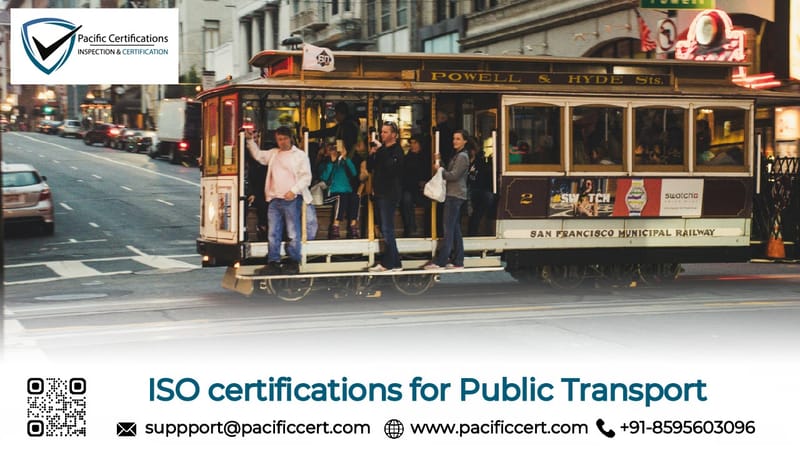ISO Certifications for Public Transport Industry, Requirements and Benefits

Introduction
Public transport service providers operate in a highly safety-critical, and service-intensive environment where reliability, passenger safety, asset availability, environmental performance, and continuity of operations directly affect public confidence and economic activity. The public transport industry includes bus services, metro and rail operators, tramways, ferries, urban transit authorities, and integrated mobility providers serving millions of passengers daily.
As cities expand and mobility demands increase, public transport organizations face growing expectations around service quality, safety assurance, infrastructure resilience, data security, environmental sustainability, and regulatory compliance. Authorities, funding agencies, and passengers increasingly require structured governance and measurable performance rather than informal operational controls.
ISO certifications provide public transport organizations with internationally recognized management system frameworks to demonstrate controlled service delivery, robust safety management, environmental responsibility, secure information handling, and dependable operational continuity across complex transport networks.
In public transport, trust is built not only by moving people efficiently, but by doing so safely, reliably, and consistently every day.
Quick Summary
ISO certifications provide public transport organizations with globally accepted frameworks to manage service quality through ISO 9001, occupational health and passenger safety through ISO 45001, environmental responsibility through ISO 14001, asset reliability through ISO 55001, energy efficiency through ISO 50001, information security through ISO/IEC 27001, business continuity through ISO 22301, and enterprise risk governance through ISO 31000. These certifications help public transport providers deliver safe, sustainable, and reliable mobility services while strengthening regulatory and public confidence.
For more information on how we can assist your public transport organization with ISO certifications, please contact us at [email protected]
Why ISO Certifications Matter
Public transport organizations manage life-critical operations, high passenger volumes, and complex fleet assets, where even minor lapses can result in safety incidents, legal penalties, service disruptions, or reputational loss. ISO certifications bring documented controls, transparent governance, and proactive risk prevention, strengthening public confidence and institutional capability, while also meeting procurement and regulatory expectations.
Applicable ISO Standards for Public Transport Industry
Below are the most relevant ISO standards applicable to public transport operators, transit authorities, and mobility service providers.:
ISO 9001: Quality Management Systems
ISO 9001 is the most widely recognized standard for quality management systems (QMS). It sets the criteria for a QMS based on several quality management principles, including strong customer focus, leadership, the process approach, and continuous improvement.
ISO 45001: Occupational Health and Safety Management Systems
ISO 45001 focuses on occupational health and safety (OH&S) management. Given the inherent risks in the transport sector, such as accidents and employee safety issues, ISO 45001 helps public transport businesses ensure the well-being of their employees and passengers.
ISO 14001: Environmental Management Systems
ISO 14001 outlines the criteria for an effective environmental management system (EMS). It helps organizations improve their environmental performance through more efficient use of resources and reduction of waste.
ISO 50001: Energy Management Systems
ISO 50001 is designed to help organizations manage and reduce their energy consumption and improve energy performance. Energy efficiency is a major concern for public transport sector, given the high energy consumption associated with fleet operations. ISO 50001 assists in optimizing energy use, reducing costs, and supporting global efforts to combat climate change.
ISO 55001:2014 – Asset Management Systems
Public transport relies on high-value assets including vehicles, depots, tracks, signalling systems, power infrastructure, and stations. ISO 55001 ensures lifecycle-based planning, maintenance, and performance monitoring of these assets to improve reliability and reduce breakdowns.
ISO 39001: Road Traffic Safety Management Systems
ISO 39001 is focused on road traffic safety management, aiming to reduce deaths and serious injuries related to road traffic crashes. For companies operating road-based transportation, ISO 39001 provides a structured approach to managing road safety.
Click here to find out more applicable standards to your industry
Contact us today to start your certification journey!
What are the requirements of ISO certifications for Public Transport Industry?
Public transport sector operates in complex and demanding environments, where maintaining high standards of safety and customer satisfaction is crucial. Below, are the general and specific requirements:
General Requirements
Service delivery procedures covering routes, schedules, ticketing, and passenger assistance
Driver qualification standards, background checks, skills evaluations, and fatigue-management programs
Fleet maintenance logs, workshop processes, periodic inspections, defect recording, and repair planning
Passenger-safety rules, on-route emergency handling, CCTV monitoring, and critical incident logs
Accessibility policies for seniors, children, and people with disabilities
Environmental monitoring — emissions tracking, waste handling, cleaner fuel use or EV adoption plans
Training frameworks covering safety, communication, and punctuality management
Complaint handling logs and service-quality tracking — delays, breakdowns, ticket system failures
Internal audits, management reviews, and long-term performance improvement goals
Digital ticketing and passenger-data protection policies for cybersecurity compliance
Specific requirements:
ISO 9001:2015 – Quality Management Systems (QMS)
Establish a Quality Management System that includes documented processes and procedures.
Define the quality policy and objectives, aligning them with customer requirements and regulatory obligations.
Regularly monitor and measure performance through internal audits and management reviews.
Implement corrective actions to address non-conformities and continuously improve processes.
ISO 14001:2015 – Environmental Management Systems (EMS)
Develop an Environmental Management System that identifies and manages environmental aspects and impacts.
Set and review environmental objectives and targets, considering legal requirements and stakeholder expectations.
Implement controls to minimize environmental risks, such as pollution prevention, waste management, and resource conservation.
Conduct internal audits to assess environmental performance and drive continual improvement.
ISO 45001:2018 – Occupational Health and Safety Management Systems (OHSMS)
Establish an Occupational Health and Safety Management System that identifies hazards and assesses risks.
Define safety policies, procedures, and responsibilities to protect employees and the public.
Implement risk controls, emergency preparedness, and incident response measures.
Conduct regular safety audits and reviews to ensure compliance and improve safety performance.
ISO 50001:2018 – Energy Management Systems (EnMS)
Implement an Energy Management System to track and manage energy consumption.
Set energy objectives and targets, aligned with energy policies and legal requirements.
Establish energy performance indicators (EnPIs) to monitor energy efficiency.
Conduct energy reviews and implement energy-saving measures to achieve continual improvement.
Tip: Start by mapping one complete passenger journey, from boarding to exit and identify where policies already exist and where gaps still need attention.
If you are looking for ISO Certification for your company, contact us today at [email protected].
What are the benefits of ISO Certifications for Public Transport Firms?
ISO certifications are suitable for urban transit authorities, bus operators, rail and metro systems, ferry services, and integrated mobility providers. Key benefits include:
When passengers see a transport operator committed to safety, maintenance, and structured service delivery, confidence grows naturally.
Safety management and staff training help reduce driver-related risks and operational mishaps.
Scheduled maintenance and structured asset planning keep vehicles in better running condition.
Formal complaint handling, punctuality tracking, and training systems improve how frontline teams interact with riders.
ISO 14001 and ISO 50001 support cleaner fuels, EV programs, and energy monitoring as cities shift toward greener mobility.
ISO 22301 helps systems continue running or recover quickly during strikes, power failures, pandemics, network breakdowns, or weather emergencies.
The global public transport sector is experiencing accelerated modernization. The International Association of Public Transport (UITP) notes smart mobility investment will exceed USD 1.2 trillion by 2030, and more than 45 percent of global bus fleets are expected to be electric by 2030 versus ~17 percent in 2023. Cities such as London, Dubai, Singapore, and Delhi have mandated structured safety systems in fleet operations, increasing ISO 45001 and ISO 39001 adoption.
Digital fare systems, ridership data platforms, and fleet telematics have grown by over 25 percent in two years, making ISO 27001 a strategic requirement. Funding agencies like ADB, World Bank, and JICA now score operational governance and safety compliance, making ISO certification a competitive advantage in transit modernization initiatives.
How Pacific Certifications Can Help
Pacific Certifications is accredited by ABIS provides , impartial ISO audits and certification services for public transport authorities, metro and rail operators, bus fleets, smart-mobility platforms, and supporting infrastructure service providers. Certification ensures that organizations can demonstrate compliance, operational accountability, safety maturity, and performance management aligned with international standards,
We support public transport organizations through:
Independent ISO certification audits for transport and mobility operators
Objective assessment of fleet governance, safety programs, data controls, and asset systems
Audit reports highlighting strengths and areas for improvement
Transparent certification decision process under accreditation guidelines
Read More at: Blogs by Pacific Certifications
Author: Seema

